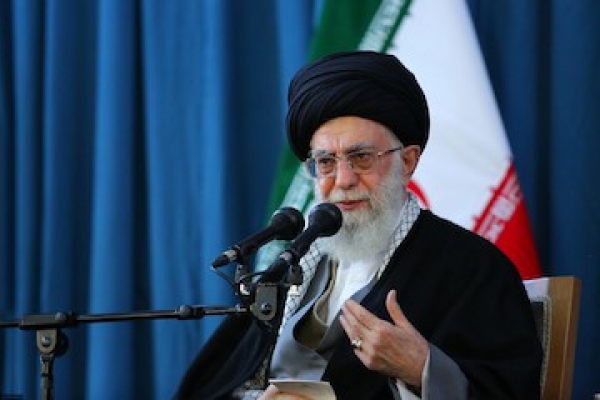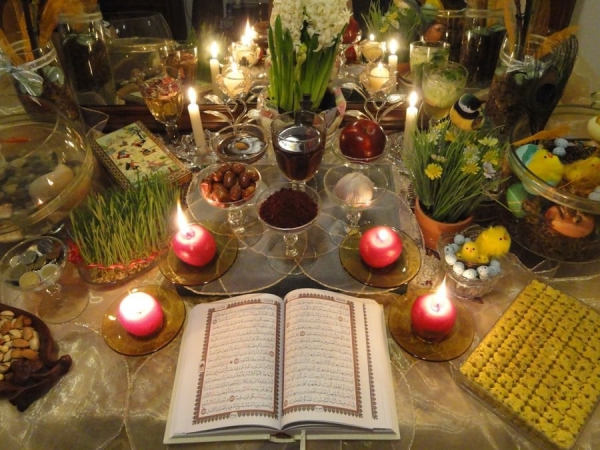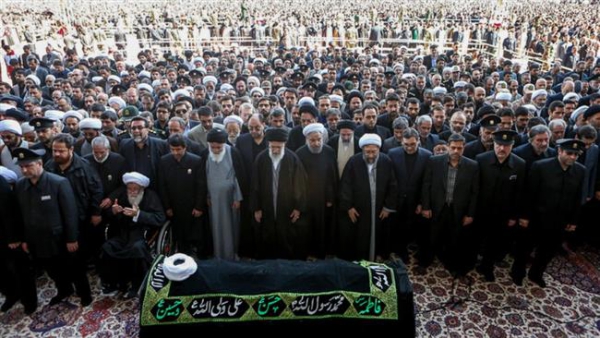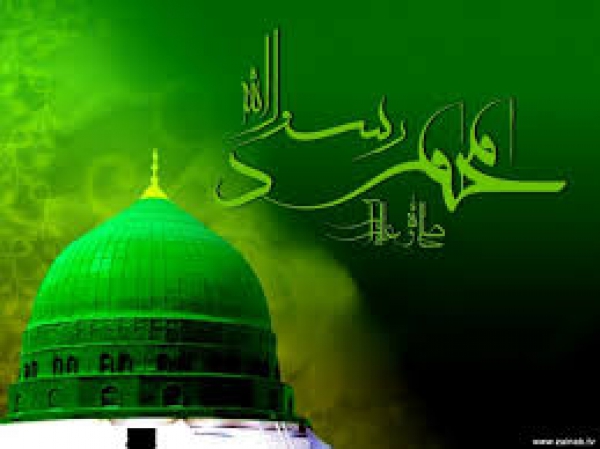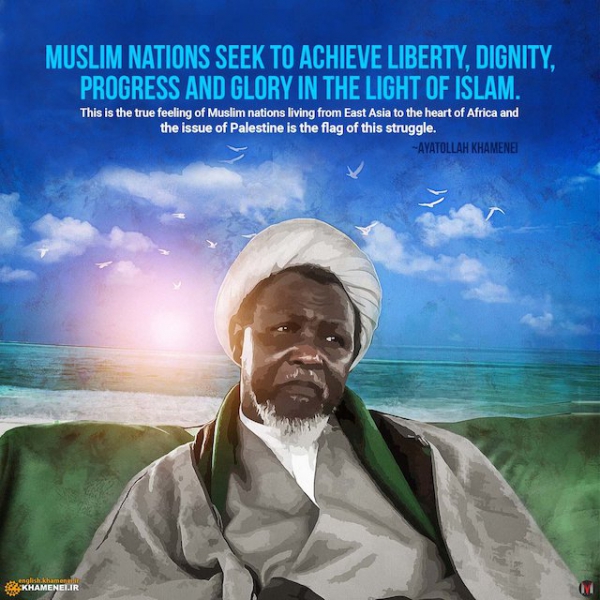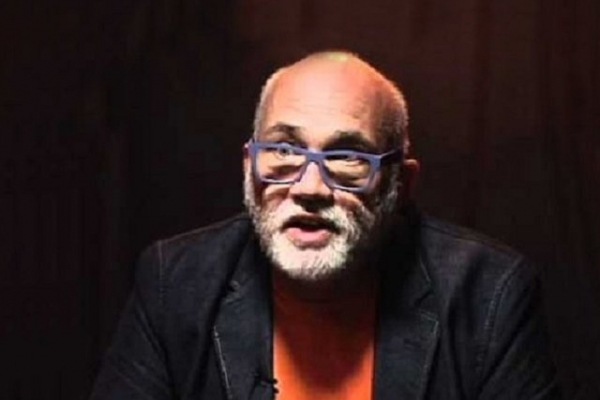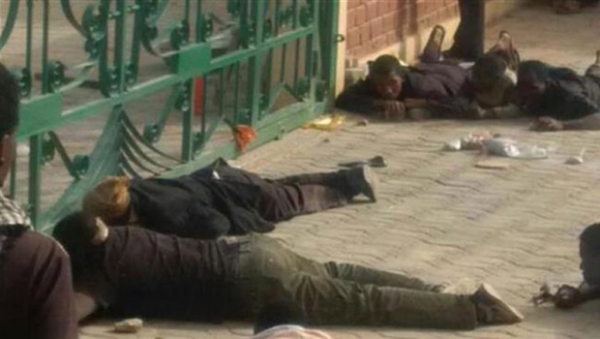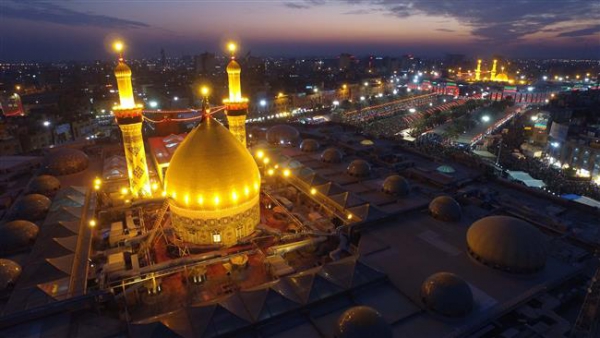hasania
US wants to restore its hold on Iran: Ayatollah Khamenei
Leader of the Islamic Revolution Ayatollah Seyyed Ali Khamenei says the US government is seeking to restore its hegemony over the Islamic Republic.
“They (the Americans) are moving in this direction in a bid to be able to reinstate their previous hegemony,” Ayatollah Khamenei told a large crowd of pilgrims in the holy city of Mashhad on the first day of Persian New Year on Saturday.
The Leader said Iran’s 1979 Islamic Revolution freed the nation of Washington's deep-rooted grip, adding that Iranians proved that it is possible to stand up to the US. He said the revolution handed the country back to the nation, its true owners.
Before the revolution, Ayatollah Khamenei said, that US used to plunder Iran’s riches and the ousted Pahlavi regime was the main base of the UK and the US in the region.
The Leader reiterated that the Iranian nation has no issues with the American people but the US administration is the enemy of Iran.
Pointing to Iran's nuclear agreement with the P5+1 group of countries, known as the Joint Comprehensive Plan of Action (JCPOA), Ayatollah Khamenei said the other side, under various pretexts and through deception, is not fully implementing its side of the deal such as removing all obstacles to Iran's banking transactions or unfreezing the country's assets abroad.
Ayatollah Khamenei said there is no guarantee that President Barack Obama’s successor would “fulfill these minimum obligations.”
“The US presidential candidates are vying with each other in inveighing against Iran...These are [proof of] enmity,” said the Leader.
Ayatollah Khamenei said the Secretary of the Treasury Jack Lew is making ceaseless efforts in order to prevent Iran from benefiting from the JCPOA results.
Regarding his choice of an economic motto for the New Year, namely “Resistance Economy; Plan and Action,” the Leader said that the West seeks to imply that Iranians have only one of two choices, namely either to come to terms with the US or suffer economic hardships.
The Leader said the West seeks to indoctrinate the Iranians and propagate the notion that they must either bow to the demands of the US or suffer the consequences.
Ayatollah Khamenei said the West would like the Iranians to back down from its demands such as on the issue of Palestine and turn into what the US would like it to be and like some regional states be reconciled with "the Zionist enemy."
The Leader said the West, if not resisted, will gradually expand its demands to the point where it will question the very founding principles of the Islamic Republic.
وَاللَّهُ الَّذِی أَرْسَلَ الرِّیَاحَ فَتُثِیرُ سَحَابًا فَسُقْنَاهُ إِلَى بَلَدٍ مَّیِّتٍ فَأَحْیَیْنَا بِهِ الْأَرْضَ بَعْدَ مَوْتِهَا كَذَلِكَ النُّشُورُ
And it is Allah who sends the winds, and they stir the clouds, and We drive them to a dead land and give life thereby to the earth after its lifelessness. Thus is the resurrection. (Al-Fatir:9)
What is Nowruz?
The word `Nowruz` is a compound word; No and Ruz together mean New Day, and it is the name of the first day of the first solar month.
Abū Rayhān al-Bīrūnī in his definition of Nowruz says: `It is the first day of the month of Farvardin( March 21th) and the reason it is called New Day is that it is the forehead of the year `.
The emergence of Islam and its peaceful dealing with other religious beliefs and rituals, including ceremonies and rituals of the Iranian people, resulted in Nowruz to remain untouched.
In Iranian ancient belief, Nowruz is the day when the Creator finished the creation of the world and is the day when Man was created.
It was also celebrated in Syria, Egypt and North Africa but not regularly. After the spread of Islam and its adaptation by the people of Iran, Nowruz found its way to expand to wider range of people even amongst non- Iranian tribes, such in Indian continent and North Africa.
Nowruz has been highly regarded. Alameh Majlesi in Assamae va al Alam has narrated one of the sayings of Imam Sadiq (a) as follows: ` With the beginning of Farvardin, human was created, and this day is an auspicious day for praying to seek dreams, to visit the nobles, acquiring knowledge, marriage, travelling and good business. In this blessed day the sick will be cured, the babies are born hassle free and sustenance will increase. ` Majlesi also talks about another narration from Imam Musa Kadhim (as) which says: `In Nowruz Allah made a covenant with His servants to worship Him and not to allow any partner for Him. To welcome, His messengers and obey their rulings. This day is the first day that the fertile wind blow and the flowers on the earth appeared. The archangel Gabriel (a) appeared to the Prophet, and it is the day that Abraham (as) broke the idols. The day Prophet Muhammad (S) held Ali (as) on his shoulders to destroy the Quraishies' idols in the house of God, the Kaaba.`
In addition the most symbolic rituals of Nowruz which is the preparation of `seven S` has both ancient and Islamic roots. In his research `Nowruz and the Philosophy of Seven S` Mohammad Ali Dadkhah explains: `Number seven, is sacred and part of the elite. The choice of this number in the preparation of Nowruz is very significant. In the ancient Iran this number was associated with seven holy immortals. In astronomy number seven is the house of dreams, and accomplishing wishes is promised in the seventh abode.` Alameh Majlesi in regards to the importance of number seven says: `The heaven and Earth each have seven levels and each level is guarded by an angel.` He also says: `If at the time of New Year, one recites seven verses of Qur'an which starts with letter S, one would be protected against any afflictions`.
Eid, in this verse is referring to a Divine blessing descended from heaven in the form of a tray, or trays of delicious and edible food, so it became a sign for people to commemorate such day every year and bring joy and happiness repeatedly. Also repetition and return of such days could return same blessings which give us, human, another chance to make connection with God and remembering Him in our hearts and by our tongues.
Imam Jafar Al Sadiq(as)said: `When Nowruz comes, make Ghosl (ceremonial wash) , put on your clean clothes, and fragrant yourself with best perfumes, so when you are free of all other prayers, perform a four- rakaat prayer, each two rakaats one Salam and in the first rakaat after Sura Al- Fateha ten times Sura Al-Qadr, and in the second rakaat after Al-Fateha ten times Al-Kaferoon. In the thried rakaat after Al- Feteheh ten times Al-Nass and Al-Falaq. After prayer prostrate in gratification.` As we can see the rituals of Nowruz is the same as rituals for any other Islamic Eids of which its supplication starts with offering salutations to the messenger of Allah and his progeny and all the messengers of God. Nowruz has always been celebrated by Iranians. Its customs, despite the thousands of years, has never been demolished or forgotten.
Nowruz has been a festivity celebrated by all the tribes, ethnic groups or religions that existed and lived in the Iranian Plateau for centuries and today many other countries, celebrate noruze such as Afghanistan, Pakistan, India and even some central Asian countries such as Kurds of Turkey, Iraq and Syria celebrate it too.
1000s attend Ayatollah Tabasi’s funeral in Mashhad
Thousands of Iranians have taken part in the funeral procession for Ayatollah Abbas Va’ez Tabasi, the custodian of Imam Reza Holy Shrine, in the northeastern city of Mashhad.
Leader of the Islamic Revolution Ayatollah Seyyed Ali Khamenei took part in a funeral ceremony for Ayatollah Va’ez Tabasi on Saturday and led the prayers.
President Hassan Rouhani and Parliament Speaker Ali Larijani were also among the senior Iranian officials who attended the funeral in Iran's second biggest city.
Ayatollah Tabasi died at the age of 80 on Friday a week after being hospitalized for respiratory complications.
Ayatollah Khamenei and President Rouhani had earlier issued messages of condolences on the death of the veteran cleric.
Ayatollah Tabasi had served as the custodian of Astan Quds Razavi, a charity foundation that oversees the holy shrine of Imam Reza and various related institutions, since the victory of the Islamic Revolution in 1979.
The senior cleric had been directly appointed to the position by the late founder of the Islamic Republic, Imam Khomeini.
He was also a member of Iran’s Expediency Council and the Assembly of Experts.
Ayatollah Va’ez Tabasi was born in Mashhad in 1935. He was laid to rest at the Imam Reza shrine on Saturday.
The Demise of Hazrat Fatima (A), the Daughter of Prophet Muhammad (PBUH)
Hazrat Fatima (615 – 632 A.D.), mother of the Imams (A), is the daughter of the Messenger of Allah (PBUH) by his first wife, Khadija daughter of Khuwaylid, may the Almighty be pleased with her. Hazrat Fatima was born in Mecca on a Friday, the 20th of Jumada II in the fifth year after the declaration of the Prophetic message which corresponds, according to the Christian calendar, to the year 615.
She was only 18 and 75 days when she passed away in Medina few days only (some say 75 and some say 95) after the death of her revered father (PBUH). She was buried in Medina in an unmarked and unknown grave. According to her will, her husband, Imam Ali (A), did not leave any marks identifying her grave, and nobody knows where it is. According to Shiite Muslims, she was the only daughter of the Holy Prophet (PBUH).
Hazrat Fatima has nine names/titles: Fatima فاطمة, al-Siddiqa الصديقة (the truthful one), al-Mubaraka المباركة (the blessed one), al-Tahira الطاهرة (the pure one), al-Zakiyya الزكية (the chaste one), al-Radhiayya الرضية (the grateful one), al-Mardhiyya المرضية (the one who shall be pleased [on Judgment Day]), al-Muhaddatha المحدثة (the one, other than the Prophet, to whom an angel speaks) and al-Zahra الزهراء (the splendid one).
The Prophet (PBUH) taught Hazrat Fatima (A) divine knowledge and endowed her with special intellectual brilliance, so much so that she realized the true meaning of faith, piety, and the reality of Islam. But Fatima (A) also was a witness to sorrow and a life of anguish from the very beginning of her life. She constantly saw how her revered father was mistreated by the unbelievers and later how she herself fell a victim to the same abuse, only this time by some “Muslims”.
The motherly blessings and affection received by Fatima (A) were only for five years after which Khadija left for her heavenly home. The Holy Prophet brought her up thereafter.
The Holy Prophet said: “Whoever injures (bodily or otherwise) Fatima, he injures me; and whoever injures me injures Allah; and whoever injures Allah practices unbelief. O Fatima! If your wrath is incurred, it incurs the wrath of Allah; and if you are pleased, it makes Allah pleased, too.”
Hazrat Fatima (A) was called az-Zahra' because her light used to shine among those in the heavens. After arriving in Medina, she was married to Ali in the first year of Hijra, and she gave birth to three sons. Her sons were: Hassan, Hussain, Masters of the youths of Paradise, and Muhsin. Muhsin never saw the light because he was aborted as his mother was behind her house door fending for herself while rogues were trying to break into it. She had two daughters, Zainab, the heroine of Kerbala, and Umm Kulthum. Her children are well-known for their piety, righteousness and generosity. Their strength of character and actions changed the course of history.
The Holy Prophet said فاطمة بضعة مني, "Fatima is part of me". He would go out to receive his daughter whenever she came from her husband's house. Every morning on his way to the Mosque, he would pass by Fatima's house and say, "as-Salamu `alaykum ya Ahla Bay annnubuwwah wa ma`din arr-risala " (Peace be with you, O Ahl al-Bayt (Household of the Prophet) and the Substance of the Message).
Hazrat Fatima (A) is famous and acknowledged as the "Sayyidatu nisa `alamin" (Leader of all the women of the world for all times) because the Prophethood of Muhammad would not have been everlasting without her. The Prophet is the perfect example for men, but could not be so for women. For all the verses revealed in the Holy Qur'an for women, Fatima is the perfect model, who translated every verse into action. In her lifetime, she was a complete woman, being Daughter, Wife and Mother at the same time.
Hazrat Fatima inherited the genius and wisdom, the determination and will power, piety and sanctity, generosity and benevolence, devotion and worship of Allah, self-sacrifice and hospitality, forbearance and patience, knowledge and nobility of disposition of her illustrious father, both in words and in actions. “I often witnessed my mother,” says Imam Husain, "absorbed in prayer from dusk to dawn."
Her generosity and compassion for the poor was such that no destitute or beggar ever returned from her door empty-handed. She (A) worked, dressed, ate and lived very simply. She was very generous; and none who came to her door ever went away empty handed. Many times she gave away all the food she had had, staying without any food at all. As a daughter, she loved her parents so much that she won their love and regard to such an extent that the Holy Prophet (PBUH) used to stand up whenever she came to him.
The Morals and Behaviour of the Holy Prophet Muhammad (PBUH)
The more science and technology advances, the greater is the need for the observance and practice of the teachings and instructions of divine prophets in human societies. This is because science and technology provide only machines and instruments and by no means prevent their misuse by human beings.
The terrible rise in murder, other felonies, corruption, suicide and so forth clearly points to this very fact. If morality, which is a significant part of the teachings of divine prophets, does not prevail and govern in human societies, surely not only will advanced science and technology fail to ensure human peace and prosperity, but they will add to our problems and miseries.
For the exploiters and colonialists utilize advanced technology and sciences for their own satanic purposes. They murder or make homeless millions of human beings as they have always done and trample upon the rights of the weak and the defenseless.
As a matter of fact, the only factor that can halter man's restive soul and control his stormy instincts and passions and thus utilize science and technology for human prosperity and pacific life is true morality, which originates in faith in God.
The moral teachings and precepts of the divine prophets and their moral behaviour are the best means of leading man to his ideal life. It goes without saying that both in personal and in social life the observance of moral principles is required of all.
However, for those who must lead societies and guide the people, this requirement is much greater, because, first, the one who is the instructor of society must himself be a model of supreme moral behaviour and excellent human characteristics, so he will be able to wipe moral decay out of people's hearts and minds. Obviously if he himself is lacking in morality, he will fail to lead the people onto the path of humanity and virtue.
Second, the responsibility of leading human societies is so great and crucial that no one can successfully perform it unless he has perfect morals. For this reason, God selected his prophets from among those who possessed exalted spirits, great tolerance, extraordinary patience, and other excellent moral characteristics. It was with this weapon of morality that divine prophets overturned the debased societies that were plunged in corruption and led the ignorant people who had gone astray onto the path of virtue and salvation.
In the holy Qur'an, God has addressed the Prophet Muhammad (PBUH):
`Thus it is due to mercy from God that you deal with them gently, and had you been rough, hard- hearted, they would certainly have dispersed from around you' (3:159).
The sublime celestial morals of the Prophet brought about the waves of the revolution of Islam first in Arabian society and afterwards all over the world. In the light of this all-embracing spiritual and intellectual resurrection, dispersion turned into unity, unchastity into chastity and virtue, idleness into hard work and industry, selfishness to altruism, and Arab arrogance to modesty and affection.
Men and women were thus trained to become models of good moral behaviour and have altruistic manners forever. The morals of the Prophet were so sublime and praiseworthy that God has regarded them as great.
`And truly you (Muhammad) possess great morals' (68:4).
The Prophet Among The People
The Holy Prophet of Islam possessed the magnificent status of prophecy and divine leadership, but his manners in dealing with the people and his way of life were so simple and gentle that when he was among the people and a newcomer wanted to know about him, he had to ask, `Which one of you is the Prophet'? 1
He had no love for luxuries or the illusions of this mortal world. He was never enchanted by any worldly things, and he invariably looked upon this world's life as a passing one. 2
The Holy Prophet of Islam spoke in short, meaningful sentences and was never seen or heard to interrupt anybody's speech.3
He never spoke with a morose face, nor did he ever apply rough, awkward words. Unlike grants and despotic rulers, the Holy Prophet of Islam never looked at those who were addressing him with half-closed eyes. 4
The Holy Prophet of Islam did not care to sit down in the seat of honour in gatherings, and on entering any place would sit down in the= first empty seat available. 5
He did not let anybody stand up before him and treated others most respectfully. Of course, the virtuous people were most revered by him. 6
The Holy Prophet was justly angered when he observed a violation of God's commands and of Islam and was most pleased at the good deeds. Both his pleasure and displeasure were for God. He would never allow anybody to accompany him on foot when he himself was riding. He would pick him up beside himself if he was able, and if not, the Holy Prophet of Islam gave him a time for an appointment in a given place and would ride alone.
On group journeys, the Prophet would work like the others and would never let anybody work instead of him. Once on a journey, his companion asked him to allow him to do the work. In answer to this request, the Holy Prophet of Islam said, `I do not like to be treated as if I were privileged because God does not like any of His creatures to consider himself privileged or to be treated as if he were privileged over others'. And he got up and collected firewood. 7
He invariably stood by his words and pledges. He paid affectionate visits to his relatives and friends but would never take their side unduly. The Holy Prophet of Islam would never permit anybody to backbite others and said, `I want to meet people with a loving heart'.
His modesty was peerless. He was extremely patient, tolerant, and forgiving. 8
Anas ibn Malik, who was the servant of the Holy Prophet of Islam, has narrated, `I used to prepare milk for the Prophet to break his fast with. One night he was home late. Thinking that he had been a guest at somebody's house and thus had broken his fast there, I drank the milk. Before long he returned home. I asked his companions if he had broken his fast and they said that he had not.
`When the Holy Prophet of Islam was informed of the matter, he made no remark about it and behaved as if he were not hungry at all and went without supper with a cheerful face. The next day he also fasted. 9
The Holy Prophet of Islam immensely loved the ritual prayers, but on occasions when people demanded to talk to him about something, he would say his ritual prayers briefly and instead, pay attention to the demands and needs of the people. He would spare no efforts to fulfill the people's needs.
The Prophet treated everyone with great respect and considered nobility and honour to be owing to faith, piety, and good behaviour. He was not interested in wealth or status, nor did he revere anybody for his riches or position.
His behaviour towards slaves was amazingly affectionate, and he would do his best to remove the troubles and sufferings of the slaves and the poor. 10
The Prophet's Tolerance And Forgiveness
The Holy Prophet of Islam never attempted to retaliate against the insults and disrespect of anybody, and forgave people's mistakes or their misconduct. His reaction to the torment and disregard of the ignorant people was forgiveness and tolerance.11
In spite of all the tortures and torments that the Quraysh had inflicted upon the Holy Prophet of Islam, on conquering Makkah, he forgave them and set them free. 12
In the war of Uhud, a man named Wahshi killed Hamzah, the beloved uncle of the Holy Prophet of Islam. However, he forgave his sin. Also, he forgave the many torments and troubles that Abu Sufyan and his wife, Hind, had caused for him and he did not take revenge. 13However, for all his tolerance and mercifulness, he did not take pity on those who violated God's threshold and sacred precepts and would punish the violator in accordance with divine rules. In affecting God's orders, he would take no notice of anybody's intercession.
When the Prophet was informed that Fatima Mukhzumiyah had committed theft, he punished her according to the laws of Islam concerning theft and did not regard the intercession of Asamata ibn Zayd in this respect, saying, `The ruin and downfall of the preceding peoples was due to the fact that they did not enforce the laws of punishment in the case of the aristocrats and the people of status. I swear by the One in Whose hands is my life that even if Fatima (his daughter) had committed such a sin, I would cut off her hand'. 14
The Prophet's Cleanliness And Orderliness
The Holy Prophet of Islam was fond of scent 15 and spent more on buying perfumes than on food. 16 His pleasant smell filled the air of any place he passed, so that whosoever passed there knew that the Holy Prophet of Islam had passed that way.17
He used to brush his teeth frequently 18and washed his blessed hands both before and after meals. 19Whenever the Holy Prophet of Islam was about to leave his house, he would look into a mirror or into water; he always left home with a clean, pleasant appearance. 20
The Prophet Was A Pious And Sincere Worshipper Of God
The Holy Prophet of Islam had great love for ritual prayers so that during the night he would get up several times, brush his teeth, and then offer the most devoted prayers. 21He would stand worshipping God and talking sincerely to the Almighty Creator for so long that as a result of so much standing in prayer, his legs were swollen. 22
The Holy Prophet of Islam took lessons from watching the sky, the moon, the sun, and every other thing in nature, and these phenomena attracted him to their Creator more than to themselves.
He was so devout and pious that not even for a single moment was he enchanted by any luxury or pleasure of this mortal world. In short, the Holy Prophet of Islam was a perfect model of all excellent virtues and sublime human qualities.
In such a small book it is not possible to describe all his praiseworthy manners and morals. In fact, we have just presented a pale reflection of his celestial, resplendent portrait so that all over the world Muslims who regard themselves as the followers of Islam can make his morals and conduct their own model of behaviour and learn divine morality and correct programs for life from him.
As the Holy Qur'an says,
`Certainly you have in the Apostle of God an excellent exemplar for he who hopes in God and the latter day, and remembers God much' (33:21).
May God's greetings be upon him who was the selected superior and the best of pious human beings. And the greetings of the angels upon the faithful.
We too greet him most cordially and sincerely. May he accept our respectful greetings as well as the greetings of you, our sisters and brothers in Islam. May Almighty God help all of us to follow exactly the blessed footsteps of the Holy Prophet, whose path is sure to lead us into eternal salvation and paradise.
To end this book, we narrate an invaluable tradition of the Holy Prophet of Islam and his honoured family. In the Holy Qur'an there is a verse closely related with the Tradition of the Cloak:
`And stay in your houses and do not display your finery like the displaying of the ignorance of gore; and keep up prayer, and pay the poor-due (zakat) and obey God and His Apostle. God only desires to keep away the uncleanliness from you, O people of the House! and to purify you a thorough purifying' (33:33).
This verse is famous as the ayat-i-tathir and is closely related with the Tradition of the Cloak. The following is the tradition:
One day the Holy Prophet of Islam came to the house of his daughter, Fatima, and told her that he was very tired and asked her to cover him with his cloak. As she was covering the Apostle of God, his face lit up and shone like the full moon. After a while Imam Hasan came to the house and said that he could smell the fragrance of his grandfather. Fatima said that he was resting under the cloak. Hasan greeted the Holy Prophet and asked his permission to come under the cloak. The permission was granted.
Similarly, Husayn, 'Ali, and Fatima, after greeting him and receiving permission from the Apostle, went under the cloak. Fatima, peace be upon her, said that when they, the ahl al-bayt, gathered under the cloak, Almighty God said, `Let it be known to you, my angels and those who are in the heavens, that I swear by my honour and might that I have not created the heavens and the earth and what are in them, but only out of love for the five honourable ones who are under the cloak'.
Gabriel asked God who was under the cloak. God informed him that they were the people of the house of the Apostle. Gabriel requested permission from God to be the sixth under the cloak. Gabriel greeted the Prophet and received permission to enter under the cloak. Gabriel said that God has created the universe because of them and out of love for them. And
`God only desires to keep that which is ritually unclean away from you, O people of the House, and to purify you a thorough purifying'. (33:33).
'Ali asked the Holy Prophet to explain the significance of their gathering under the cloak. The Prophet said, `I swear by God that whenever this tradition will be recited among our friends and lovers, God's mercy will descend upon them and the angels will surround them and ask forgiveness for them until they disperse. God will also remove the sorrow and answer the prayers of those who had come to ask'. 'Ali swore by the Lord of the Ka'aba that the ahl al-bayt and their friends had profitted both in this world and the next.
`Surely God and His angels bless the Prophet. O you who believe! Call for blessings on him and salute him with a good salutation' (33:56).
1. Bihar ul-Anwar, Vol. 16, pp.220-229.
2. Ibid.
3. Kohl ul-basar, p.69.
4. Bihar ul-Anwar, Vol. 16, pp.226-228.
5. Ibid., p.240.
6. Ibid., pp.229, 281, 182.
7. Kohl, pp.67-68.
8. Bihar ul-Anwar, Vol. 16, pp.226-232.
9. Kohl, pp.67-68.
10. Bihar ul-Anwar, Vol. 16, pp.228-229.
11. Ibid., pp.264-265.
12. Kamil, Vol. 2, p.252.
13. Ibid., pp.248-252.
14. Irshad us-Sari Lisharhi Sahih Bukhari, Vol. 9, p.456.
15. Wasa'il, new edition, Vol. 1, p.442.
16. Ibid., Vol. 1, p.443.
17. Safinat, Vol. 1, p.419.
18. Wasa'il, new edition, Vol. 1, p.349.
19. Ibid., Vol. 16, p.472.
20. Ibid., Vol. 3, p.344.
21. Ibid., Vol. 1, p.365.
22. Kohl, p.78.
Islamic Movement is about unity against injustice: Sheikh Zakzaky's daughter
Sheikh Ibrahim Zakzaky has never identified himself as a leader of a sect, or the Islamic movement as a sect. The Islamic movement’s main agenda is to oppose injustice and anyone from anywhere including non-Muslims are welcome to join the movement.'
Ms. Nusaibah Ibraheem Zakzaky, the daughter of Allama Sheikh Ibrahim Zakzaky, the leader of the Islamic Movement in Nigeria, in an exclusive interview with Khamenei.ir, has talked about the brutal repression of Muslims in her country and the kidnapping of his father.
Would you please update us on the latest incidents and the conditions of Sheikh Zakzaky and the Shia community, how many have been injured or killed?
I cannot say for certain anything about my father’s condition or his whereabouts as we have not been allowed access to him since he was shot and taken by the Nigerian military. As of the number of people killed, some estimate it to be at 1000 or more, there have already been reports of bodies in one hospital being estimated at 300 people. We have seen pictures of the army burying people in a single mass grave and burning some corpses. These people have at least a thousand family members waiting to identify their loved ones and bury them. If the Nigerian government and the world don’t do anything about this, so many people will never know what happened to their loved ones and a lot of evidence will be buried.
Why do you think, the Nigerian army has committed such a massacre? What are the reasons in your opinion?
Well of course they came up with a lot of excuses one of which was that a road blockade and an attempted assassination of the chief of the army staff- of which they released an edited version of a video. A more extended version of that video was released and there was absolutely no attempt on anybody’s life, but I think people should really see the video for themselves and judge it for themselves. The fact, however, that the army thought this was a valid excuse to kill hundreds of people should really alarm every Nigerian and people in the world in general.
What are some of the most significant activities of the Islamic Movement in Nigeria?
Well, one that was just interrupted is the Maulud (birth anniversary) of the Prophet and Usboo’ul Wahda (The Week of Unity). My father has never identified himself as a leader of a sect, or the Islamic movement as a sect. So, in this event, Muslims from all over are invited so that we celebrate our similarities rather than our differences. There are of course many more events.
Why do you think a movement so popular and with millions of followers has been cracked down by the military in such a brutal manner?
The Nigerian military cannot just act on their own, they must be following orders. This isn’t the first time they have done something like this, they have been doing it for years and they are never held accountable for their actions. We are the only people in Nigeria that really challenge corruption and injustice. The Nigerian Army views us as a threat; throughout our more than 30 years of existence, we have never attacked anybody even when they attack us.
Why do you think while the army could have benefited from peaceful interactions with a social active group like the Islamic movement in Nigeria, it decided to adopt a radical approach?
The Islamic movement’s main agenda was to oppose the injustice that we were forced to live under. Anyone from anywhere including non-Muslims are welcome to join our social movement. As for whether a peaceful interaction will be beneficial for the army, am not sure if that is what they would have wanted. Nigeria is one of the only places in the world where the people are made to be scared of officials that are supposed to keep them safe like the army. When people see the police or soldiers they get scared and run, because these officials can kill them or torture them without any reason and no one will do anything about it. Also from everything that transpired, there is absolutely no way this wasn’t premeditated. They wanted to do this, and they used the road blockade as an excuse.
What do you think will be the potential consequences of this massacre for the Muslim community in Nigeria?
It wouldn’t matter what our beliefs were; as long as we accept to live under the current oppression of the army, they would not have attacked us. This massacre should mean a lot to every single Nigerian whether they are Muslims or not. And it should also matter to everyone in the world. If the army can kill a thousand or more people over a ridiculous reason like this, then every Nigerian should worry about what other reason they might propagate to kill anyone they want to kill. Also I would like to mention that if this was Muslims killing non-Muslims, the world would have reacted to it, it would have been world news, every major network would have been talking about it, but as you can see, not that much coverage is seen from the media, and this is by no means due to little evidence because as I write this interview right now, bodies are being buried in mass graves but still no one cares. Everyone will express their regret later though, when everything is over.
Anthony James Hall appreciating Ayatollah Khamenei's 2nd letter to the West
"The meanings you convey transcend generational boundaries even as they also transcend religious, national, ethnic and ideological borders. To me it is clear you are addressing all of humanity in these times when the world is poised on the brink of global war.
Ayatollah Sayyed Ali Khamenei
Supreme Leader of the Islamic Republic of Iran
10 December, 2015
Dear Supreme Leader,
Thank you for your second letter addressing the Youth of Western Countries. The letter’s title, “Today Terrorism Is Our Common Worry,” suggests that the audience for your wise and inspired commentary is not constrained to any particular age, because the universal nature of the divine truths you impart is ageless.
The meanings you convey transcend generational boundaries even as they also transcend religious, national, ethnic and ideological borders. To me it is clear you are addressing all of humanity in these times when the world is poised on the brink of a global war.
At this moment of monumental crisis, when the forces of madness, division, and media engineered hatred are made to seem so pre-eminent, you have placed before us a blessed place of sanctuary. You have provided men, women and children of goodwill a literary space of contemplative reflection away from the psychological, militaristic, and economic storms all around us. Thank you for securing a refuge for moderation, reason, toleration and careful reflection in the midst of the mental and physical chaos that some of the most powerful cliques in the West are quite deliberately inculcating.
To me the terms “imperialism” and “colonization” are brought to the forefront by your observation that “the Western world is insisting on the cloning and replication of its culture on a global scale,” that this process involves the “trivialization of independent cultures.”
Terrorism and Colonization in the Western Hemisphere
This Western world’s efforts to replicate itself on one imperial frontier after the next, began to gather momentum after 1492. That was the year when Christopher Columbus initiated a process whose true nature should be put at the forefront of contemporary questions about how North Americans should best respond to the massive migrations of violently uprooted Islamic populations from the Middle East.
After 1492 the whole Western Hemisphere was remade as a frontier zone for the re-settlement of European migrants as well as for the forced and involuntary migration of Black Africans as slaves. In this process the “independent cultures” of the Indigenous peoples of the Western Hemisphere--- those incorrectly described by Columbus as “Indians”--- were indeed “trivialized” and worse, much worse
The colonization of the First Nations of the Western Hemisphere extended over several centuries right up to the present day. Too often a shroud of amnesia is made to obscure this unbroken saga, a saga of theft and oppression extending even to genocide. In this terrible cycle of injustice the so-called Indians of the Americas became true witnesses of the violent extremes of which Western imperialists are capable. As evidenced now by the violent uprooting of millions in the Levant, this wanton destruction of ancient and independent cultures becomes especially intense when the lust for ownership and control of new lands and resources is cloaked in the language of religion.
The Founding of the United States as a White Settler Polity
The emergence of the United States as a settler polity on the frontiers of Western imperial expansion would have enormous consequences for the whole world. These days the rise of the most heavily militarized superpower the world has ever known is having especially grave consequences for the Indigenous peoples of Palestine, Syria, Iraq, Yemen and Lebanon. As you explain in your letter, the recent surge of violence in Paris needs to be seen in the context of the enormous suffering, disruption and homicidal insanity being rained down on countless innocent Muslim victims especially in the Middle East.
Although the founders of the United States invoked the language of universal human rights in their famous Manifesto of 1776, the Declaration of American Independence included racist provisions. The Black slaves amassed in the process of building up the tobacco and cotton plantations of the southern Anglo-American colonies were not to be included as rights-bearing citizens in the new republic. The Black slaves of America would remain the private property of the slave masters for most of the following century.
Moreover, The American Declaration of Independence included provisions whose effect was to racially profile and criminalize the Indigenous peoples then living on the lands that the United States was created to annex, control, incorporate and own in the forthcoming transcontinental expansion. This feature of the Declaration of Independence helps explain the psychology of the so-called Global War on Terror, a massive campaign of military and psychological warfare that can be said to originate on July 4, 1776, as much as on September 11, 2001.
Responding to the attempt by the UK’s King George III to incorporate Indian lands into British North America through negotiation rather than conquest, Thomas Jefferson and the other drafters of the Declaration of 1776 accused the British monarch as follows: He has excited domestic insurrections amongst us, and has endeavoured to bring on the inhabitants of our frontiers, the merciless Indian savages, whose known rule of warfare, is undistinguished destruction of all ages, sexes and conditions.
Manufacturing Enemies for the Permanent War Economy
It seems the United States has from its inception defined its real or imagined enemies in ways that help justify, define, and energize its imperial expansions. The Red Indians described in the Declaration of Independence as “merciless Indian savages” gave the nascent US war machine its original enemies. The Red Indians were subsequently replaced by the Red communists whose real, imagined or manufactured threat to the United States provided a justification to maintain and build up America’s permanent war economy.
The real beneficiaries of this system of aggression and domination assert ownership and control over the lion’s share of the tight corporate network of banking, military and media institutions currently vying for complete domination of the world’s political economy. Since the demise of the Soviet Union on the late 1980s, a new enemy was required to justify the continuing usurious, mental and military incursions into the diminishing realm of human health, freedom, dignity, self-determination and cultural independence.
The ongoing crusade to expand the frontiers of Western imperial powers extends to the contamination of our mental, spiritual and physical environments as well as to the pollution of life’s sacred cycles of ecological renewal. With the events of 9/11 the new enemy of Islamic terrorism was cast in the role once assigned to the Red communists and, before that, to the “merciless Indian savages.” After the Cold War a new global enemy was required and a new global enemy was invented, armed, financed and set in motion to continue the hierarchical structure of a very corrupt pyramid of power.
The Global War on Terror maintained the same top-down regime of elitist oppression that coalesced in dispossessing the Indigenous peoples of the Western Hemisphere and in building up the so-called permanent war economy in the course of the Cold War.
False Flag Terrorism and Takfiri Mercenary Armies
Those who identify most with the expansionary schemes of the Zionist state of Israel have been leading architects of the so-called Global War on Terror. The concocted false flag events of 9/11 were instrumental in transforming the predominately Muslim and Arab peoples indigenous to the lands of so-called “Greater Israel” into the perceived global enemies of the so-called “West.”
The very conception of the “West” is being re-engineered in the course of a gigantic psychological operation made to downplay the creative role of Islam. It is simply not true that the “West” emerged exclusively from Judeo-Christian roots and that Islam is an aberration recently imposed through newcomer immigration. We must not forget, for instance, that the genesis of the European Renaissance drew heavily on Islam as expressed, for instance, in the constructive interactions between Jews, Christians and Muslims that took place in the caliphate of Al-Andalus on the lands of present-day Spain.
As documented and explained by Edward Said and other scholars of the overlap of Islam and Christendom, the pluralism within Islam has from time to time been cynically manipulated and exploited to advance the interests of Western imperialism. After the Second World War, the United States adopted this heritage from Hitlerian Germany, in the quest to exploit Islam as an obstacle to the atheistic domination by the Soviet Union over parts of southern Eurasia.
The role in the 1980s of the CIA in creating, training, financing, and arming a Salafi proxy army to overthrow the Soviet backed government in Afghanistan is well known. One of the outgrowths of this project is al-Qaeda. The CIA’s al-Qaeda became a kind of prototype of concocted Islamic terror. Al-Qaeda provided agents and patsies to be exploited in false flag terrorism such as that which took place on 9/11.
Al-Qaeda and its successors including al-Nusra and DAESH are best understood as Takfiri mercenary armies to be deployed in the process of poisoning Western minds against Islam. These mercenaries also provide firepower as well as the ruse of an enemy to be defeated. Those engaged in such operations are made to seem in the Western media like independent entities motivated exclusively by religious fanaticism. The entities often financed and directed by Western intelligence agencies are, however, something quite different in reality.
The real aim of the invaders in the 9/11 wars is not to fight Islamic terror. It is rather to continue the process of toppling governments and whole societies slated for destruction by those vying for monopolistic domination. Those pushing forward the new incarnations of the Global War on Terror, often project onto those who, according to them, are fighting the very qualities that they themselves epitomize.
The New Metropolis of an Old Empire
The cataclysmic outcome of this genre of malevolent intervention is on full display in Libya. Who can doubt that Syria has become the frontier for the application of imperialism’s updated formula for domination through divide-and-conquer? Who can doubt that beneath the deceptions of the Global War on Terror lie the politics of oil, pipelines and Israeli schemes for regional and global aggrandizement?
The Global War on Terror could better be described as the continuation of Western imperialism with Israel as the new metropolis of an old empire with roots going back to the conquest of the Americas beginning in 1492. The continuation of this war agenda requires the creation of a constant flow of new terrorists as currently provided by DAESH, the proxy army whose sponsors prominently include Saudi Arabia, Qatar, Turkey and the United States as well as many of their corporate patrons and clients. Your letter, Supreme Leader, provides a very insightful account of the fevered mental environments that have become instrumental in advancing DAESH’s recruitment strategies.
In conclusion let me quote your letter where you note, “The overt and well-known supporters of takfiri terrorism—despite having the most backward political systems—are standing arrayed as allies of the West while the most pioneering, brightest and dynamic democrats in the region are suppressed mercilessly.”
Since my visit to Tehran last year, I have had the pleasure and honour of meeting some of these pioneering, bright and dynamic democrats. Some of them, I have reason to believe, give you advice and suggestions from time to time. I am happy for the wealth of inspiration they must provide you through the grace of God.
Your comments about the Western powers tendency to ally themselves with “the most backward political systems” have very important contemporary implications with many historical antecedents. Unfortunately a perennial characteristic of imperialism is its tendency to dominate peoples on the frontiers of empire through the empowerment of puppet regimes engaged in systems of remote control domination through indirect rule.
It is the younger generation who can change these patterns of manipulation and control provided they receive proper and sound education from a variety of steadfast sources including those at the forefront of the Islamic Revolution in Iran.
Yours Sincerely,
Anthony James Hall
Professor of Globalization Studies
University of Lethbridge
'Nigeria’s Shias buried in mass graves'
A human rights group says it has credible evidence of mass graves containing bodies of Shia Muslims recently martyred by the Nigerian army.
According to Press TV, Islamic Human Rights Commission says it has photographs and testimonies that prove the army has buried hundreds of bodies after attacking Shias in Zaria earlier this week.
The brutal raid left over one thousand people dead, and dozens missing including Leader of Nigeria’s Islamic Movement Sheikh Ebrahim Zakzaky.
The UK-based group called on the African Union and the United Nations to facilitate the release of all detainees, and suspend Nigeria’s membership.
Islamic Human Rights Commission also expressed concerns over rumors of a planned crackdown against Muslims in the Kano state on Friday.
It urged all international observers to be on watch for any acts of violence targeting Shia Muslims especially at Friday prayers.
Meanwhile, top Shia and Sunni clerics in Iraq have deplored the deadly raid launched by Nigerian forces against Head of the African country’s Islamic Movement, Sheikh Ibrahim al-Zakzaky.
Iraqi religious leaders say the attack was aimed at creating conflict between Muslims in Nigeria and other Islamic countries.
Iraq hosts over 26 million pilgrims for Arba’een
More than 26 million pilgrims are taking part in the mourning rituals of Arba’een in Iraq, Transport Minister Baqir Jabr al-Zubeidi says.
Zubeidi said the number of pilgrims is on course to hit 27 million on the culmination of the grand event on Friday. Some 60 percent of the pilgrims are women, according to the Iraqi minister.
Arba’een rituals take place in Karbala and mark the 40th day after the martyrdom anniversary of the third Shia Imam, Imam Hussein. Imam Hussein and 72 of his loyal companions, including family members, were martyred on Ashura, the tenth day of the lunar month of Muharram, in the battle of Karbala against the second Umayyad caliph, Yazid I, in 680 A.D. Imam Hussein was martyred after he refused to pledge allegiance to the tyrant ruler.
Pilgrims from over 100 countries, including Iran, have been gathering in Karbala for over a week to mark Arba’een, defying threats by Takfiri terrorists to attack them. Many of the mourners have reached the city on foot to show their devotion to the Shia Imam.
Iraqi officials also said they had adopted special security measures this year to protect pilgrims against possible terrorist attacks.
In a message on Friday, Iran’s Foreign Minister Mohammad Javad Zarif thanked Iraqi authorities, government and people for successfully hosting millions of pilgrims.
